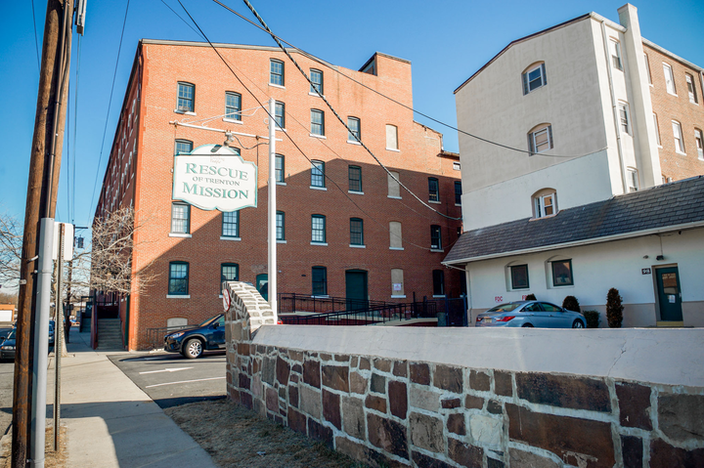Vernon Jeter has a wide smile and full head of black hair, but his youthful appearance hides that fact that he has probably spent a quarter of his days in prison.
Not exactly sure how many years he has spent behind bars, Jeter, 59, estimates it is between 15 and 18 years - for an armed robbery in 1982 and other serious offenses. But it's a later conviction that made it more difficult for him to put his life back together.
In 2009, he sold a number of small bags of heroin, worth around $70 to $80, he said. Cops were watching. He was arrested and pleaded guilty to drug distribution charges, spending several months behind bars. That crime, specifically, hindered his efforts to go through recovery and start a life void of crime, Jeter said.
“It sent me spiraling, like I don’t have nothing to look forward to,” he said.
• • •
In New Jersey, a convicted killer may qualify for some forms of public assistance.
But not drug dealers, and many caught with drugs in school zones.
Many with drug distribution-related offenses on their record are permanently ineligible for general assistance benefits, which includes small cash assistance and access to emergency housing help, according to a spokesperson with the New Jersey Department of Human Services.
General assistance is meant to help residents facing a financial emergency. Benefits are limited over a person’s lifetime. Other housing assistance programs are available, each with their own set of limits and eligibility rules, but general assistance is unique in that it is meant specifically for a crisis when a person would be ill-served by a wait list for affordable housing, for example. Other programs are available for the disabled or people with children even if they have been convicted of drug distribution crimes.
To qualify for general assistance, applicants must have almost no assets. The benefit provides single adults with $140 a month. People eligible for emergency assistance, meant to help those at risk of homelessness, may receive subsidized motel stays, transitional housing, shelters and rental assistance.
“This is really the bottom level of the social safety net,” said Steven Leder, a senior attorney at the advocacy organization
Community Health Law Project.
In 1997, however, amid a widespread feeling that general assistance was a good thing being squandered on bad people, the New Jersey legislature passed a law that permanently banned those convicted of drug dealing from receiving the benefits.
Retired Assemblywoman Charlotte Vandervalk, a Republican, was a prime sponsor of the bill.
“You shouldn’t give them something good because they did something bad,” she said, explaining the feeling among the majority in the Legislature. “You can’t reward people because they have disobeyed the law.”
It's a sentiment still shared by some people today.
Robert Rector, a senior research fellow at the Heritage Foundation who has worked on welfare policy for decades, said it was unwise to provide money to people who demonstrated they were irresponsible.
The drug and welfare laws of the 1990s "sent a signal that if you behaved a certain way, you weren’t going to get assistance in the future,” Rector said.
But the struggling economy and persistent homeless problems in New Jersey have some now questioning that policy as the debate over stemming illegal drug use shifts from punishment to rehabilitation.
State Sen. Sandra Cunningham, D-Jersey City, introduced legislation this month to lift the state's permanent ban on general assistance benefits for drug felons.
“Hopefully, this will help to eradicate a little bit of the homeless problem that we have,” Cunningham said.
“We already have barriers [to] employment” – for
people with drug distribution convictions – said Maura Sanders, an attorney with Legal Services of New Jersey. “They really are met with no support and no services.”
People like Vernon Jeter. Theodore Upchurch. And Sylvester Mercer.
• • •
Sylvester Mercer, 51, is a former drug dealer who served his time in prison and got out only to learn he was banned from benefits that could help him put a roof over his head.
Once he was back in the community, “I realized I couldn’t continue living my life as a drug dealer,” he said. “I looked for some kind of support.”
Since his release, however, Mercer has not had secure housing, he said. But he does receive medical help and has access to food stamps, which are now available to drug felons after changes to a state rule in 2010 and health care rules in 2014. If he had emergency housing assistance, however, he said his life would have been far more secure – better to beat his own addiction.
Theodore Upchurch, 53, was convicted of a drug distribution offense about seven years ago and spent more than a year behind bars. He has a pacemaker, diabetes and suffers from depression – conditions for which he was able to get some treatment in prison, he said. Once out of prison, he too found his general assistance eligibility was denied. He was forced to beg in the suburbs during the day to eat, and sleep in Camden at night.
The lack of medical treatment, however, caused problems. He was eventually hospitalized, received care and with the help of federal disability benefits was able to find housing.
“Once a person goes and does their time, they should not be denied,” he said.
The number of ex-drug felons denied state emergency benefits, including homeless assistance, is unknown, say officials for the state Department of Health and Human Services.
Convictions for drug distribution or intent to distribute run the gamut - from kingpins who run large distribution rings to those caught selling small amounts of narcotics on the street.
Most drug convictions in school zones, which are classified under a special statute, are penalized like a distribution offense and result in a ban on general assistance, according to the New Jersey's Department of Human Services.
The net cast by drug free school zones can be especially large.
With zones as large as 1,000 feet from a school – smaller for public housing and parks – nearly half of urban centers like Newark and Camden are covered,
according to a 2014 Boston College study.
Only six percent of rural Mansfield Township, by contrast, is inside a school zone. In part, because urban centers are home to larger minority populations, those arrested for school zone offenses skew disproportionately toward blacks and Hispanics, according to a 2005 state commission study on drug free zones.
• • •
The Rescue Mission of Trenton, which Vernon Jeter credits with helping him recover.
(Michael Phillis/PhillyVoice)
General assistance also helps subsidize recovery programs and homeless shelters, which receive some money if they take in an individual who receives those benefits. But there are people like Vernon Jeter, who do not get that financial assistance from the state, according to Mary Gay Abbott-Young, the chief executive officer of the Rescue Mission of Trenton, which runs a homeless shelter that took Jeter in.
Last year, about 15 percent of Rescue Mission clients were eligible for general assistance, which provides her shelter about $25 a day per client, said Abbott-Young. That financial reality is a budget strain, she said.
Vernon Jeter, who now rents an apartment near the shelter, spent his teenage years in Long Branch, New Jersey, getting into trouble. Today, on Facebook he has reconnected with some of the people from those years.
“It’s a group of us but there are so many of us who aren’t around anymore,” Jeter said, adding that many died from causes as varied as cancer to drug use. “I was heading more in that direction more fast and more harder than any of them.”
Yet, somehow, his many years in and out of New Jersey and Florida prisons, and his abuse of alcohol and drugs, didn’t kill him.
In December 2009, he walked out of prison in New Jersey and went out to drink again. With his Lake Street friends in Asbury Park, he said he entered a liquor store and grabbed an E & J Brandy, or as he calls it “Easy Jesus.” (The online slang site, Urban Dictionary,
defines the beverage as the “drink of homeless drunks.”)
And that’s what Jeter was ... again. He found employment for a while moving furniture, he said, but his skin broke out in eczema so bad it started bleeding on the job. He lost work, lived temporarily in a shelter and bounced around the apartments of friends.
During this time Jeter started looking for financial assistance to help find a place to live. He said the response made him feel more helpless and encouraged more bad decisions.
“I went to apply for help,” he said. “I was homeless; I didn’t have food; I didn’t have anything. I wanted a place to say.”
He could get food stamps but as Jeter says, “where was I going to put the food?” When he went to social services he was told his eligibility for emergency housing assistance and general assistance was lost because of the drug dealing charge.
“It’s like pushing me right off.”
Vernon Jeter talking about his life after getting sober in an apartment he rents in Trenton, N.J. (Michael Phillis/PhillyVoice)
Jeter remembers the conversation that got him to finally move toward recovery. It was the summer of 2013 and he was sitting on a bench, drinking, in Asbury Park. A man, who Jeter said probably recognized him somehow, encouraged him to go to the Rescue Mission of Trenton and get some help.
The next day or so, with only a few dollars in his pocket, he bought a train ticket instead of a bottle, according to Jeter. “I don’t know what made me do that,” he remembers, laughing.
He checked into the homeless shelter, went through the recovery program and got sober. He said it was still frustrating to not have access to general assistance benefits as he was looking for housing and had to rely on the good faith of the mission to extend his stay. Now, he is delivering furniture for the mission and living down the block from where he first checked into the homeless shelter. He freely acknowledges his mistakes and said he is happy with his progress. He has two roommates and a view of the federal courthouse from his front window – he said the building serves a reminder of the government’s power should he mess up.
• • •
Cunningham, the state senator, said it is more likely that convicts will commit more crimes without job and financial assistance when they leave prison.
“What are they going to do? They are either going to hit us over the head, literally, because they have to eat, sleep, breath, and we also want to encourage people,” she said. "Everybody makes mistakes in life. Everybody, we all do.”
Gov. Chris Christie's office didn’t directly address questions about the exclusion of benefits.
“The governor has been extremely vocal about a change in approach in prioritizing drug treatment over incarceration, especially for nonviolent offenders, and has led on many initiatives to make second chances a reality,” said Kevin Roberts, his spokesman.
Along with Cunningham’s legislation there is a set of proposed laws aimed at stopping the state’s drug abuse problem through rehabilitation. Christie has championed that issue and called the War on Drugs a failure.
For her part, Vandervalk said the general attitude around drugs had changed and that the law she helped pass as assemblywoman in 1997 should be revisited. At the time, Vandervalk said, she believed its penalties were too harsh, but that a less punitive bill could not get passed.
“As time goes on, there has been a recognition that you are not good, you are not bad, there are many things in – there is a gray area,” she said. "You can’t be withholding everything or that person will never get their act back together. Not only are you affecting that individual but you are affecting their families.”


